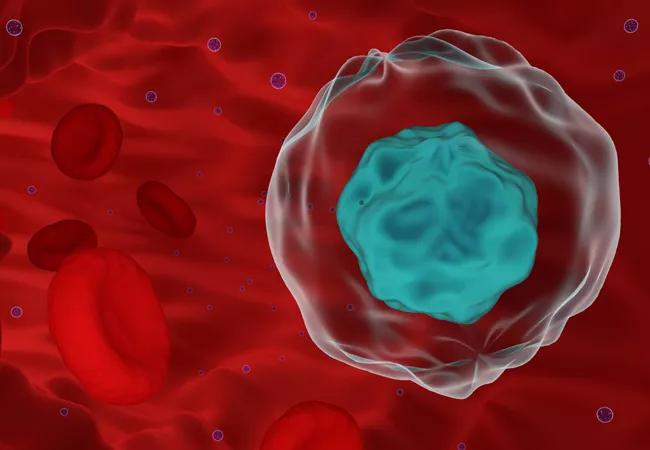Collaborating to treat this emerging complication of CPI

Advertisement
Cleveland Clinic is a non-profit academic medical center. Advertising on our site helps support our mission. We do not endorse non-Cleveland Clinic products or services. Policy
A 62-year-old male presented to my rheumatology clinic for evaluation of joint and muscle pain in the setting of checkpoint inhibitor therapy (CPI) to treat his cancer. He was diagnosed with metastatic renal cell carcinoma in 2018. He received gamma knife therapy to a brain lesion in early July 2018, then started combination CPI with ipilimumab (anti-CTLA-4) and nivolumab (anti-PD-1) for four doses.
After his first infusion, he felt stirrings of pain in his hands involving the fingers and wrists. After the second infusion, this pain significantly worsened, and he developed swelling of the proximal interphalangeal joints, metacarpophalangeal joints and wrists. The elbows and shoulders were also painful with severe stiffness, to the point that he had difficulty performing his activities of daily living.
Prior to CPI, he had knee pain from advanced right knee osteoarthritis, but no other history of rheumatic or autoimmune disease. At presentation, his fingers and wrists were swollen. He was unable to make a fist, lift his shoulders or walk due to pain and stiffness. Laboratory work up revealed an erythrocyte sedimentation rate of 46 mm/hr, C-reactive protein of 2.4 mg/dL, negative rheumatoid factor and anti-CCP antibodies. He was started on prednisone 15 mg daily, and within days his symptoms disappeared. He reported not having felt this good in the past two years. Prednisone was decreased to 12.5 mg two weeks later without worsening of symptoms.
Regarding his cancer treatment, after four cycles of combination therapy he was switched to monthly monotherapy with nivolumab, with plans to continue for the foreseeable future. After subsequent infusion, he has transient recurrence of joint pain and stiffness that have resolved. He continues on prednisone 7.5 mg daily. At this point, I presented the patient’s case at our immune-related adverse event (irAE) monthly tumor board to discuss next steps in management, as while his tumor was responding to CPI, it was causing a debilitating rheumatic irAE.
Advertisement
This case highlights many important issues surrounding patients who develop rheumatic immune related adverse events from CPI – what is the optimal treatment? Is this entity going to persist? Is it safe to be on prednisone long term while receiving CPI? Our multidisciplinary tumor board was created to help answer challenging questions like these.
In 2015, the Department of Rheumatic and Immunologic Diseases started seeing an influx of patients with rheumatic irAEs from CPI. At the time, very little was known about irAEs in general, and by 2016 we had established an interdisciplinary referral clinic with oncology to help manage these patients.
The number of patients increased, as did the uncertainty surrounding diagnosis and proper management of irAEs. This prompted creation of a multidisciplinary monthly tumor board in September 2017. The goal of the tumor board is to discuss new and/or challenging cases of irAEs, review the extant literature and receive input on interprofessional management. The field of irAEs related to checkpoint inhibitor therapy is growing quickly, and multidisciplinary collaboration is crucial for patient care, as well as to advance our knowledge in the field.
Cleveland Clinic Cancer Center hosts the meeting. In the beginning, mostly oncologists and rheumatologists attended. Now we have regular attendees from gastroenterology, ophthalmology, cardiology and pulmonology, depending on the cases presented. The week before the meeting, a coordinator from oncology emails the group asking for cases. Anywhere from three to six cases are presented per meeting, often accompanied by a discussion of the pertinent literature.
Advertisement
The cases presented are about equally split between interesting cases that we learn from in hindsight, and cases with real-time decisions to make. For the latter, the gathering of multiple specialties has helped significantly in brainstorming and presenting data from the literature or past experiences.
At the 2018 American College of Rheumatology meeting, I and my colleagues presented the impact of these novel iRAE tumor boards on clinician confidence in managing irAEs. We surveyed past board participants on the educational value of the conference as well as its perceived impact on awareness and confidence in management of irAEs. We found that two-thirds of providers felt fare more aware of and confident in diagnosing and managing irAEs.
Anecdotally, we’ve all been surprised by how much everyone enjoys and looks forward to this monthly meeting. For many of us, it’s our favorite conference, perhaps because it’s an emerging and changing field, or perhaps because it demonstrates the benefit of a multidisciplinary approach to patient care. Either way, it has definitely benefitted the growing number of patients we see with irAEs.
Dr. Calabrese is staff in the Department of Rheumatic and Immunologic Disease and is board-certified in rheumatology and infectious diseases.
Advertisement
Advertisement

The shifting role of cell therapy and steroids in the relapsed/refractory setting

Radiation therapy helped shrink hand nodules and improve functionality

Standard of care is linked to better outcomes, but disease recurrence and other risk factors often drive alternative approaches

Phase 1 study demonstrates immune response in three quarters of patients with triple-negative breast cancer

Multidisciplinary teams bring pathological and clinical expertise

Genetic variants exist irrespective of family history or other contributing factors

Study shows significantly reduced risk of mortality and disease complications in patients receiving GLP-1 agonists

Structured interventions enhance sleep, safety and caregiver resiliency in high-acuity units